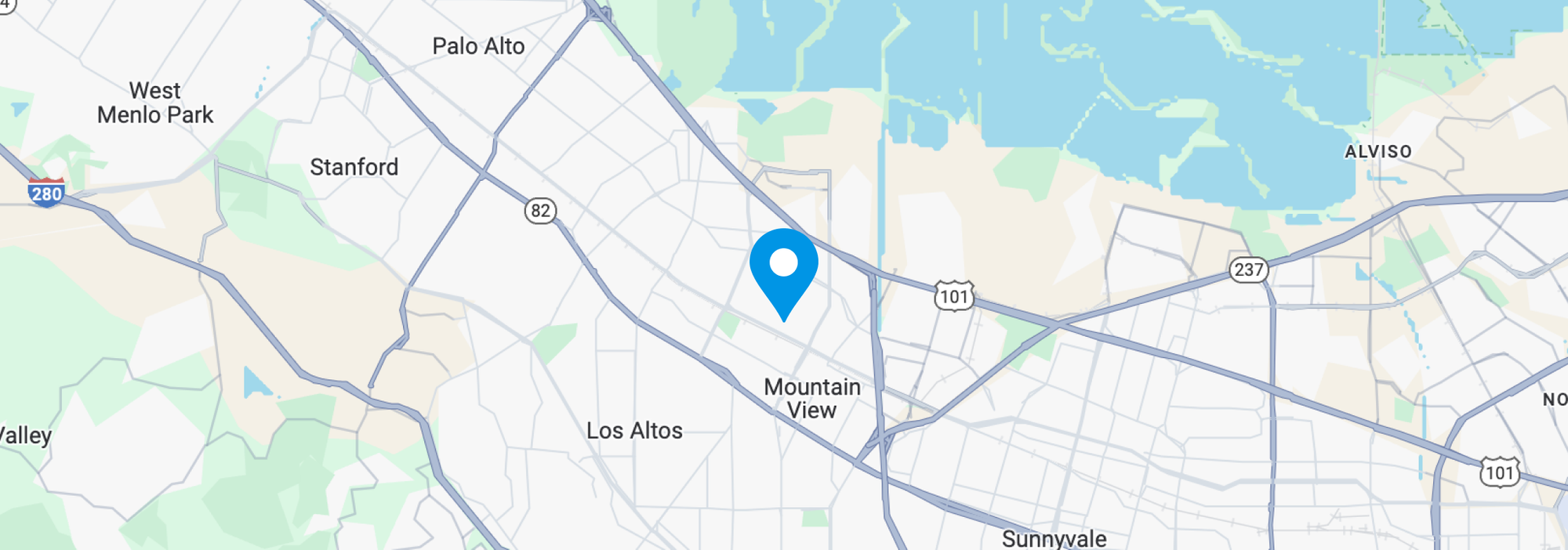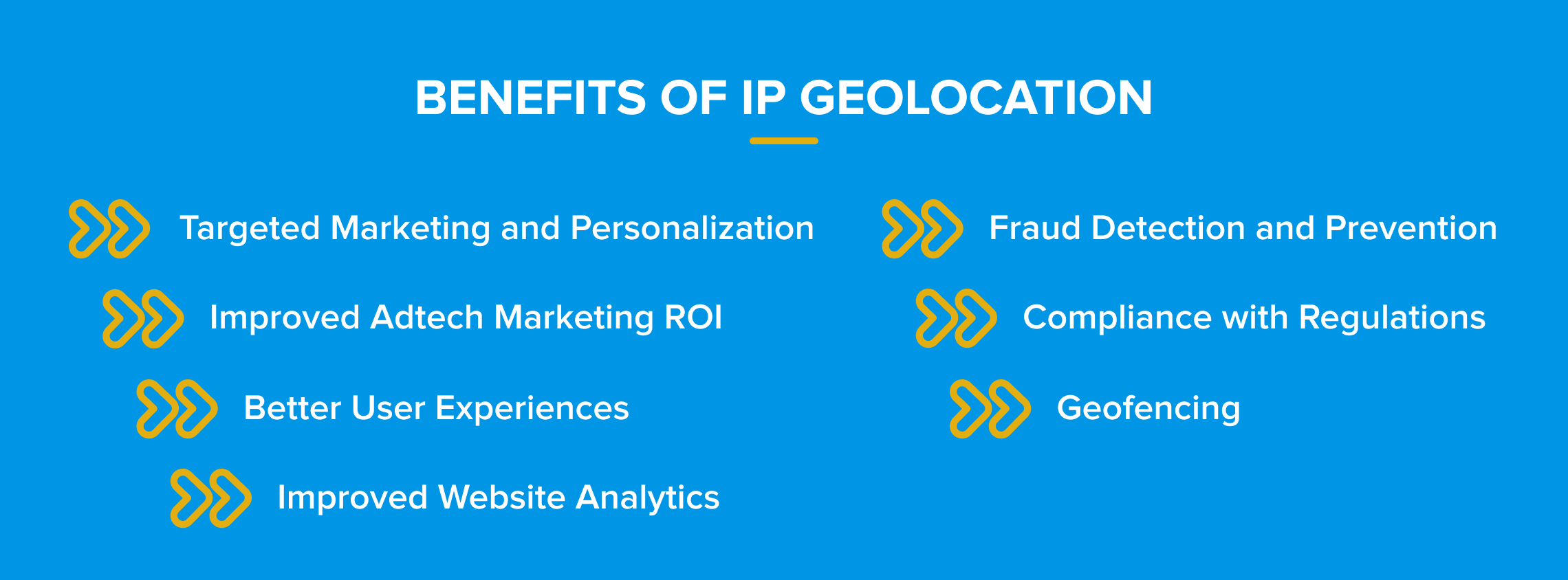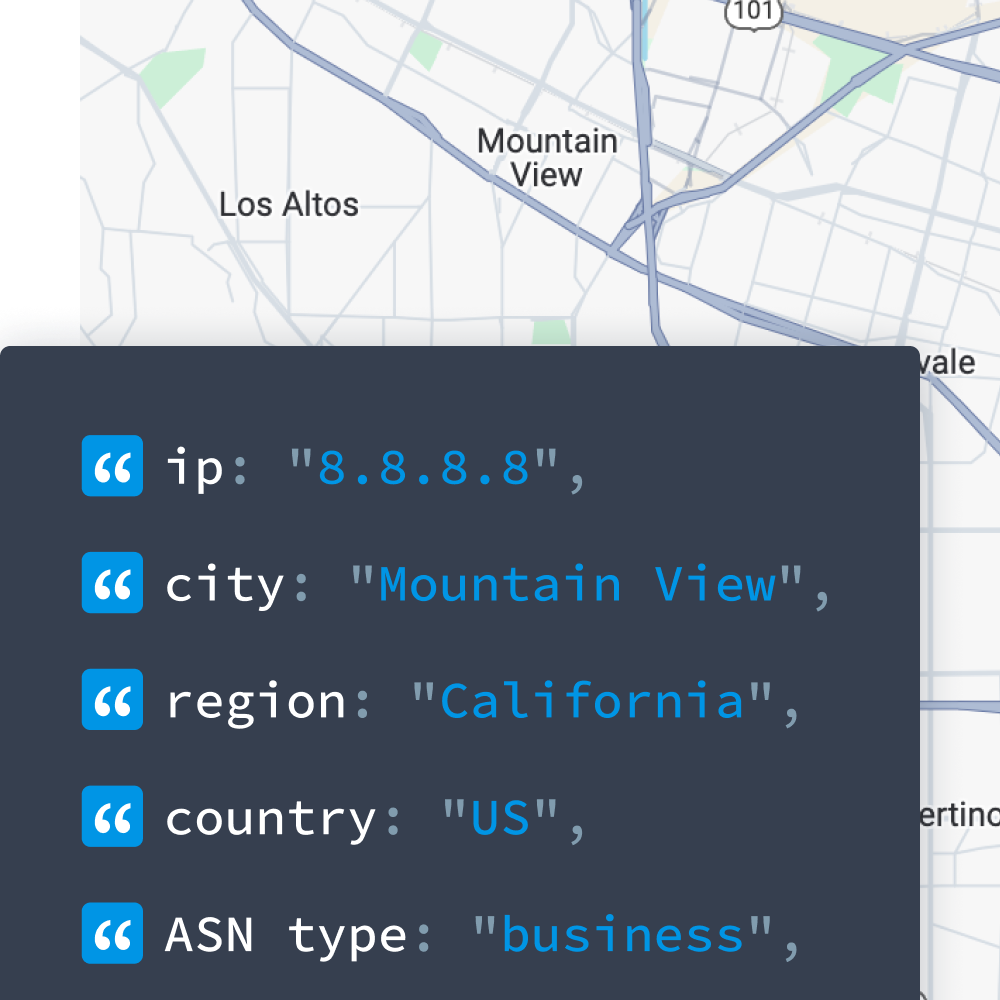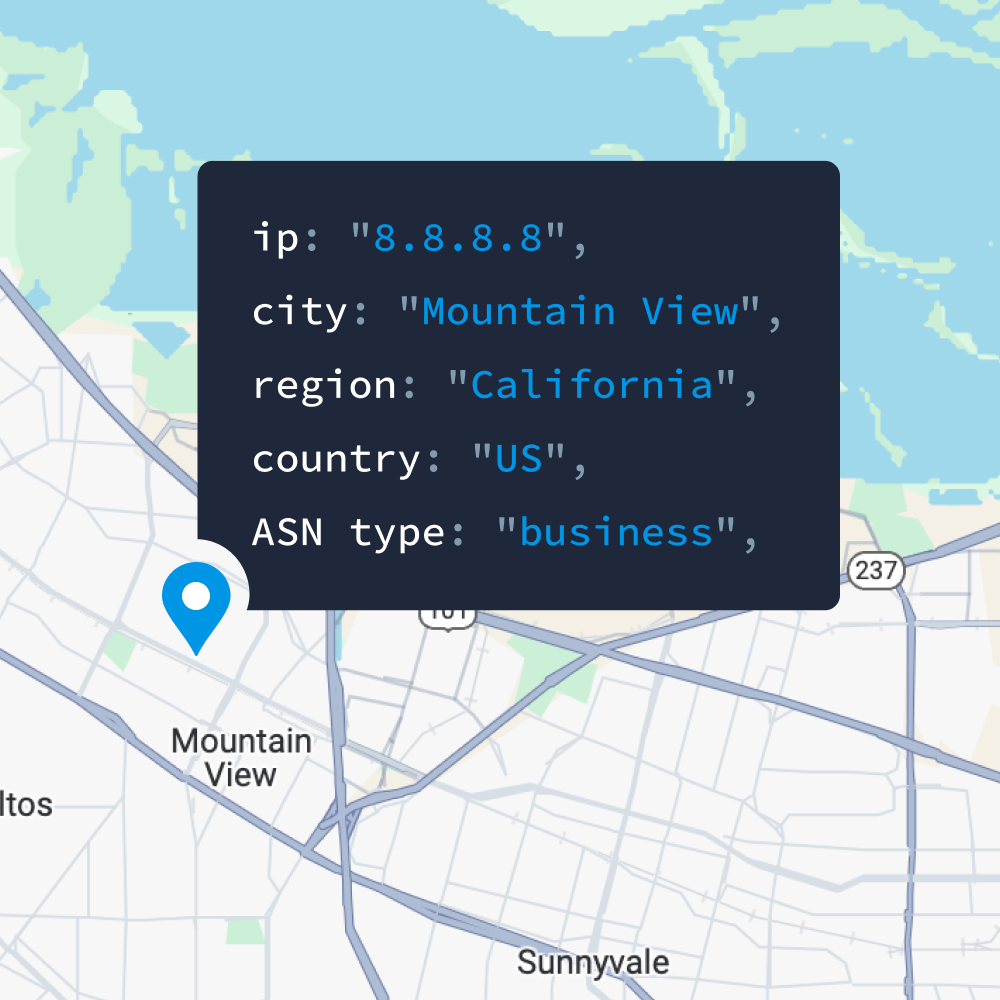Explore our IP Address Database Downloads for instant access to our IP address insights
Learn moreTop Benefits of IP Geolocation for Businesses

IP geolocation is quickly becoming an essential tool for businesses, offering more streamlined operations and a more sophisticated customer experience.
By identifying a user’s general location, companies can personalize and localize content, optimize marketing strategies, ensure compliance with regional regulations, monitor for fraud, and improve analytics.
Read on to explore how companies can harness IP geolocation to take their businesses to the next level.
How Does IP Geolocation Work?
IP addresses are unique digital identifiers for internet-connected devices assigned by the Internet Assigned Numbers Authority (IANA) and distributed by Regional Internet Registries (RIRs) to ISPs and various organizations. IP addresses point to specific locations in the online world and are documented in public WHOIS records.
When a device connects to a website via an ISP, it shares its IP address with that site. Depending on the IP address data provider that site is using, geolocation is determined by the WHOIS information, along with routing information and other relevant data. Geofeeds, provided by ISPs and network operators, offer further insights by mapping IP ranges to specific geographic locations.
Using only these methods, geolocation IP data is not as accurate or reliable as it could be. WHOIS location data is unregulated and voluntarily supplied by ASNs, leading to frequent inaccuracies. Geofeeds have many outdated or incorrect entries. Self-reported IP data can be inaccurate or deliberately manipulated. For example, hosting providers may misrepresent server locations in WHOIS records to appear closer to specific regions for commercial or logistical reasons. This creates significant challenges for businesses relying on precise geolocation.
Complicating matters further, IP addresses can change frequently. This is especially true when users employ VPNs or proxies, move to new locations, or use dynamic IPs, which are temporary and regularly reassigned, unlike static IPs that remain constant.
Many traditional geolocation providers rely solely on WHOIS data and geofeeds, which are often incomplete or inaccurate. At IPinfo, we take a more comprehensive approach to address the shortcomings of these data sources. By validating information through active measurements and enriching our datasets with verified insights, we ensure higher accuracy and reliability. . Our proprietary Probe Network uses ping measurements from multiple server locations, resulting in a robust and dynamic internet map, ensuring accurate and reliable IP geolocation data.
Benefits of Using IP Geolocation Data
Learn the locations of the IP addresses engaging with your company to improve customer experiences, make data-driven decisions about how to invest marketing spend, detect fraud, and adhere to geo-specific compliance regulations.

Targeted Marketing and Personalization
Companies use geographic market segmentation to ensure that their content and advertising reach the most high-priority leads, resulting in more relevant and meaningful user experiences. This approach drives increased engagement and boosts audience interaction by delivering personalized campaigns tailored to specific regions or demographics, ensuring users feel understood and valued.
For example, an outdoor retailer can advertise winter gear in one hemisphere while promoting summer gear in the other, providing a customized, seamless experience for users as soon as they visit the retailer’s website. By aligning marketing efforts with local needs and preferences, companies can strengthen customer relationships and enhance overall brand loyalty.
Read more IP targeting tips.
Improved Adtech Marketing ROI
By utilizing IP geolocation, companies can optimize their marketing efforts and achieve a higher ROI through precise targeting. They can minimize wasted impressions by focusing on high-potential users, ensuring ad spend delivers maximum impact. Additionally, by leveraging IP data enriched with contextual insights, businesses can filter out low-value or fraudulent traffic and focus exclusively on reaching real users who are most likely to convert. This ensures that advertising budgets are allocated to authentic and high-quality audiences, reducing wasted spend and boosting campaign efficiency.
This targeted strategy not only narrows the focus to consumers most likely to engage with a product or service but also sustains that personalized experience throughout the purchasing process, driving enhanced marketing effectiveness and ROI.
Experience Better ROI for Your Marketing with IPinfo
Access accurate IP geolocation data to optimize your marketing campaigns for better results.
Better User Experiences
From discovering a new product through a geo-targeted ad, to viewing accurate pricing in their local currency, then completing a purchase with a shipping estimate tailored to their zip code, IP geolocation creates a smooth and superior user experience.
These features—localized content delivery and pricing and currency optimization—are becoming so prevalent that users now expect them as standard. Each step of this personalized journey not only enhances convenience but also builds trust and satisfaction. By meeting these expectations, businesses can significantly boost conversion rates, strengthen brand reputation, and establish deeper connections with their audience in an increasingly competitive market.
Learn more about improving your PPC geotargeting.
Ability to Deliver Localized Content
IP geolocation enables companies to deliver highly localized content, creating a more relevant and engaging user experience. By identifying users' general geographic locations, businesses can tailor their websites to display region-specific details, such as localized product offerings, events, and advertisements. This approach ensures that users see content that aligns with their local interests and needs, fostering a deeper connection with the brand.
Companies can also enhance the user journey by providing location-based recommendations and pre-filling geographic details in forms. By focusing on localized content, businesses build trust, simplify navigation, and improve overall user satisfaction.
Price and Currency Optimization
Price and currency optimization through IP geolocation provides businesses with powerful tools to create a more valuable user experience. By detecting users’ locations, companies can automatically display prices in the correct local currency, eliminating the need for manual conversions and reducing friction in the purchasing process.
Beyond currency, businesses can tailor pricing to align with local economic conditions, making products more accessible and competitive. For example, adjusting prices to reflect regional purchasing power ensures products are appealing across diverse markets. Additionally, businesses can use geolocation to run localized sales or promotions, offering region-specific discounts.
Improved Website Analytics
Using IP geolocation allows companies to better understand where their traffic is coming from, enhancing their website analytics and helping them identify user patterns. With more precise location data, companies can improve their targeting, content localization, and marketing strategies, and make more informed decisions based on real user location data, ultimately improving overall user engagement and experience.
Privacy tools like a VPN obscure the true location of a user, but with an IP geolocation service like IPinfo’s, companies can filter out VPN traffic and get a more accurate map of where their users are located.
Fraud Detection and Prevention
Fraud detection and prevention are critical for protecting businesses from financial loss and reputational damage. IP geolocation plays a pivotal role by providing actionable insights into user behavior and location patterns, helping companies identify and mitigate risks.
By pinpointing the geographical origin of users and transactions, IP geolocation enables businesses to safeguard sensitive data, detect suspicious orders, block traffic from high-risk locations, and refine fraud risk models. It also enables organizations to respond proactively with real-time alerts for unusual login attempts, payment discrepancies, or other anomalies, especially when integrated with systems like multi-factor authentication or device fingerprinting, or behavioral analytics.
Furthermore, IP geolocation strengthens fraud defenses by helping detect automated attacks, such as credential stuffing or bot traffic, through the identification of suspicious IP patterns. Paired with IPinfo’s privacy detection capabilities, businesses gain a deeper understanding of potentially risky traffic, enabling informed and swift responses. This proactive approach fosters trust and ensures a safer online experience for users.
Detecting Impossible Travel
IP geolocation data helps identify "impossible travel" scenarios, where login attempts occur from geographically distant locations within an unfeasible timeframe. For example, logging in from New York at 10 a.m. and Tokyo at 11 a.m. indicates potential credential theft. Businesses can flag such activity and enforce measures like multi-factor authentication to protect accounts.
Credential Stuffing Mitigation
By analyzing the geolocation of login attempts, businesses can detect patterns consistent with credential stuffing attacks, such as repeated login attempts from unusual or high-risk regions. Combining this insight with other security measures, companies can block or flag suspicious activity before it leads to account compromise.
Transaction Anomaly Detection
By analyzing the geolocation of transactions, businesses can detect inconsistencies, such as payments initiated from high-risk regions or locations far from a user’s typical access points. These anomalies can trigger fraud alerts and additional verification steps.
Behavioral Insights for Fraud Models
Integrating geolocation with behavioral data allows businesses to develop advanced fraud detection models. Patterns like frequent IP changes or erratic geographic shifts can indicate suspicious activity, enabling more effective risk management.
Compliance with Regulations
IP geolocation plays a critical role in ensuring compliance with legal and regulatory requirements, particularly when handling data, financial transactions, or restricted content. By accurately identifying a user’s geographic location, businesses can address compliance and legal needs, such as ensuring GDPR compliance for EU-based users, adhering to the CCPA for California-based users, and restricting content in regions with specific censorship laws or licensing agreements.
Geolocation also helps limit access to financial services based on regional regulations, prevent gambling in restricted areas, and enforce sales tax based on user location. This ability to enforce region-specific policies strengthens data privacy and security, reducing legal risks.
Geofencing
Companies can use IP geolocation to enable geofencing, which creates virtual boundaries to control access or deliver location-specific experiences. In marketing, businesses can use geofencing to send targeted offers or advertisements to users within a defined area, increasing engagement and conversions. In cybersecurity, geofencing restricts access to sensitive systems or data based on user location, enhancing protection against unauthorized access. For operations, geofencing helps manage delivery zones by ensuring that products or services are only available within specific geographic areas, improving logistical efficiency.
Risks and Security Concerns of IP Geolocation
IP address information reveals a user’s general location, typically at the country, state, or city level, but it does not provide precise street-level coordinates. This balance of location detail allows companies to monitor suspicious activity and deliver region-specific content without compromising user privacy.
At IPinfo, we are serious about IP geolocation accuracy and user safety. Companies rely on our data to enforce compliance regulations, protect themselves from cyber attacks and fraud, and preserve brand reputations. That’s why we developed our unique approach to IP geolocation data collection and validation. We also provide bank-grade security so your IP data is safe.
Conclusion: IPinfo’s IP Geolocation API for Accurate Location Data
IP geolocation provides companies with the ability to enhance operations, improve user engagement, and ensure security and compliance. As companies continue to adapt to a digital-first world, integrating IP geolocation into their strategies will not only improve customer satisfaction but also create a competitive edge. Embracing this technology is key to staying ahead in today’s dynamic marketplace.
With so much value—and risk—riding on IP geolocation data, it’s critical that your IP geolocation provider offers the most up-to-date and accurate information. A targeted marketing campaign or access control based on location is only as useful as it is accurate.
At IPinfo, we set the standard for data excellence. Organizations ranging from startups to Fortune 500 companies rely on our data to fuel their innovations. Our proprietary Probe Network actively measures and gathers information about every IP on the internet, every day, ensuring that you receive the most reliable and accurate real-time IP data available. Our enterprise-grade API is easy to set up and use, with average 50-200 ms response time and 99.999% uptime. We offer 24/7 customer support as well as a user-focused community designed to help you achieve faster results.
Provide Better Customer Experiences Than Your Competitors
Don’t get left behind with a lack of information. Use IPinfo for up-to-date geolocation data to improve your business processes.
About the author

As the product marketing manager, Fernanda helps customers better understand how IPinfo products can serve their needs.

